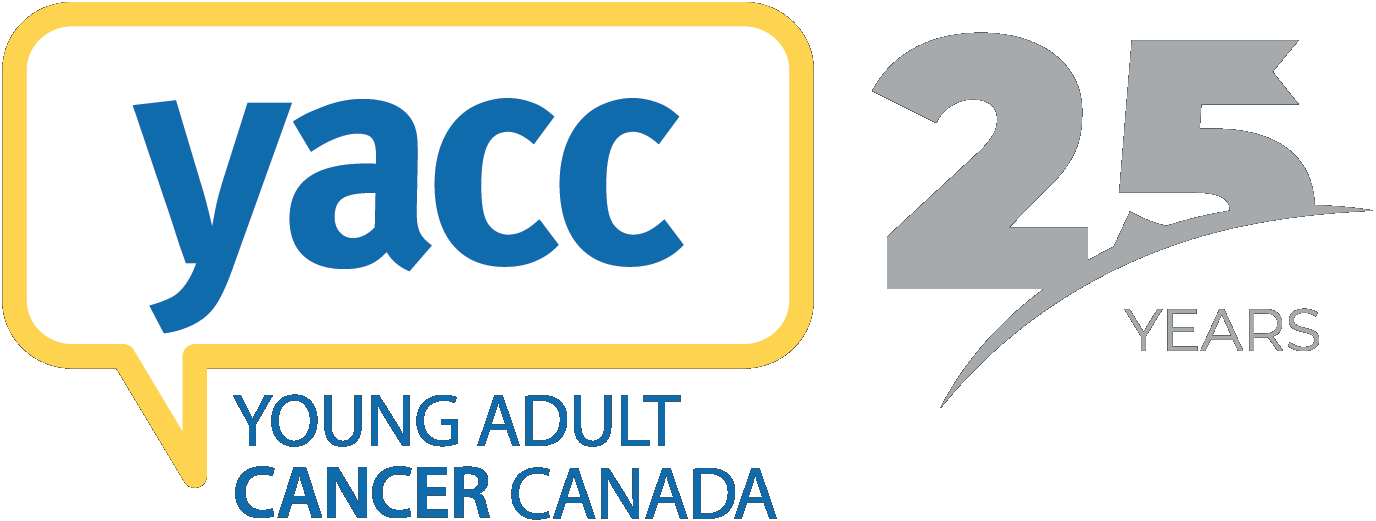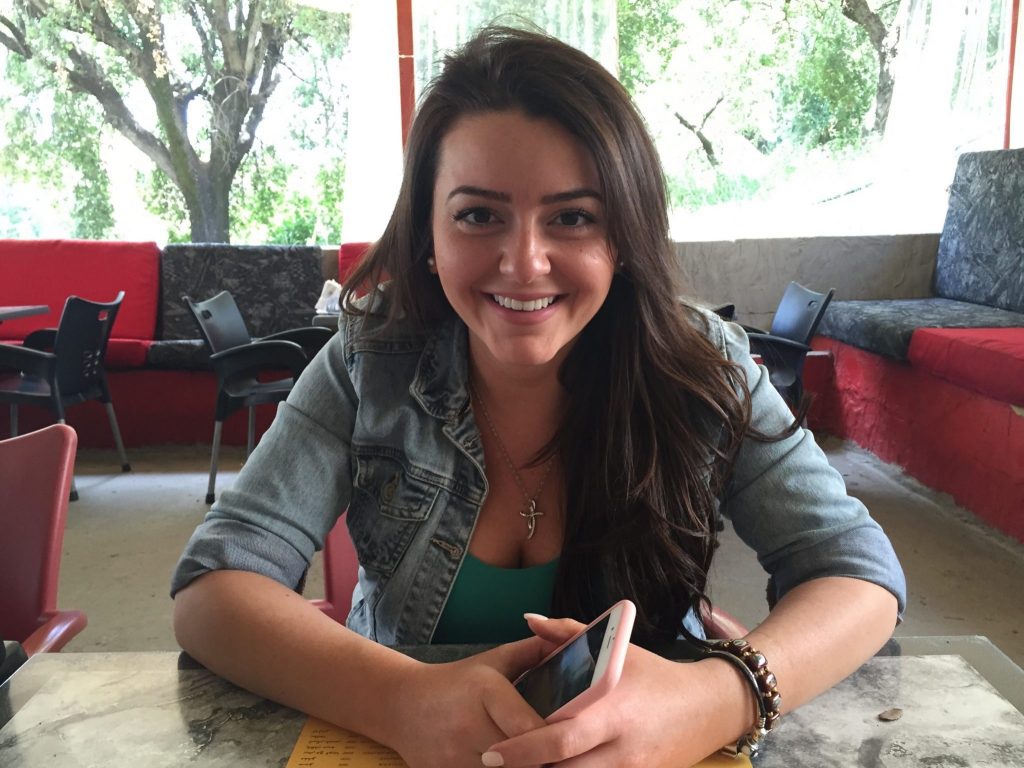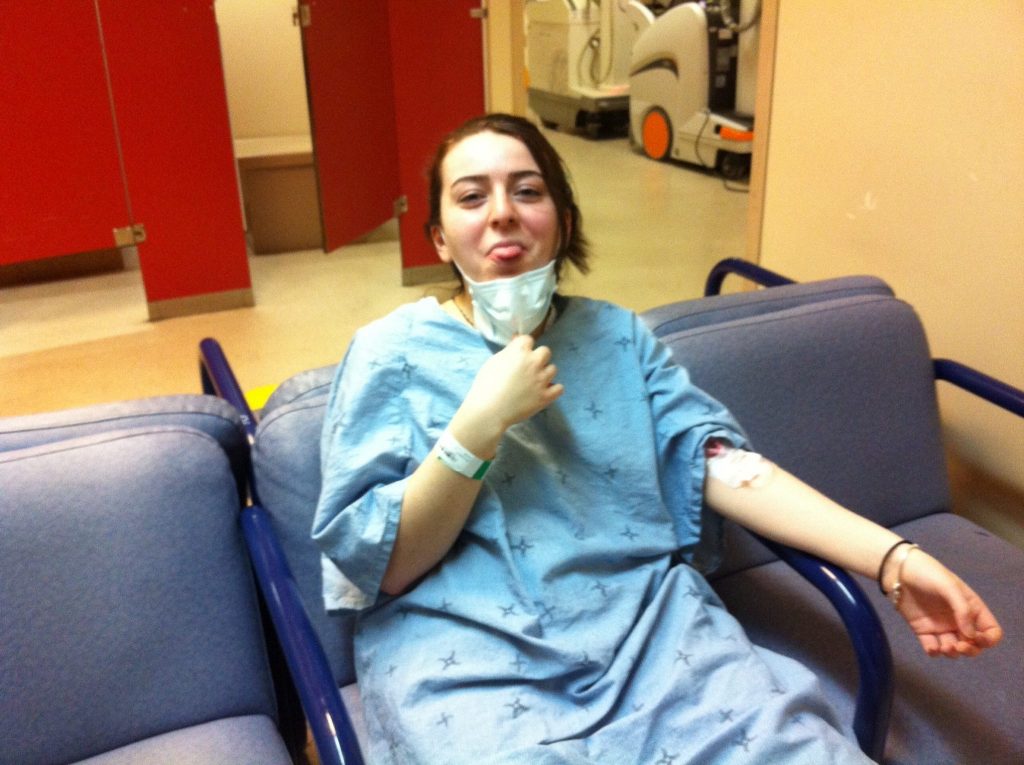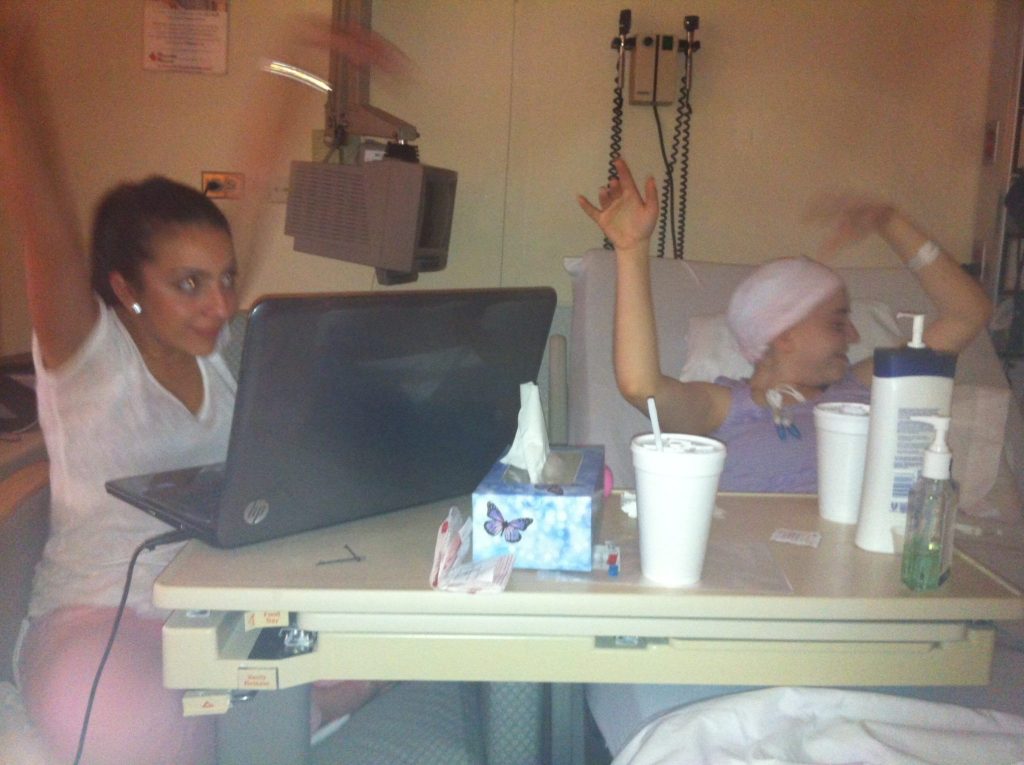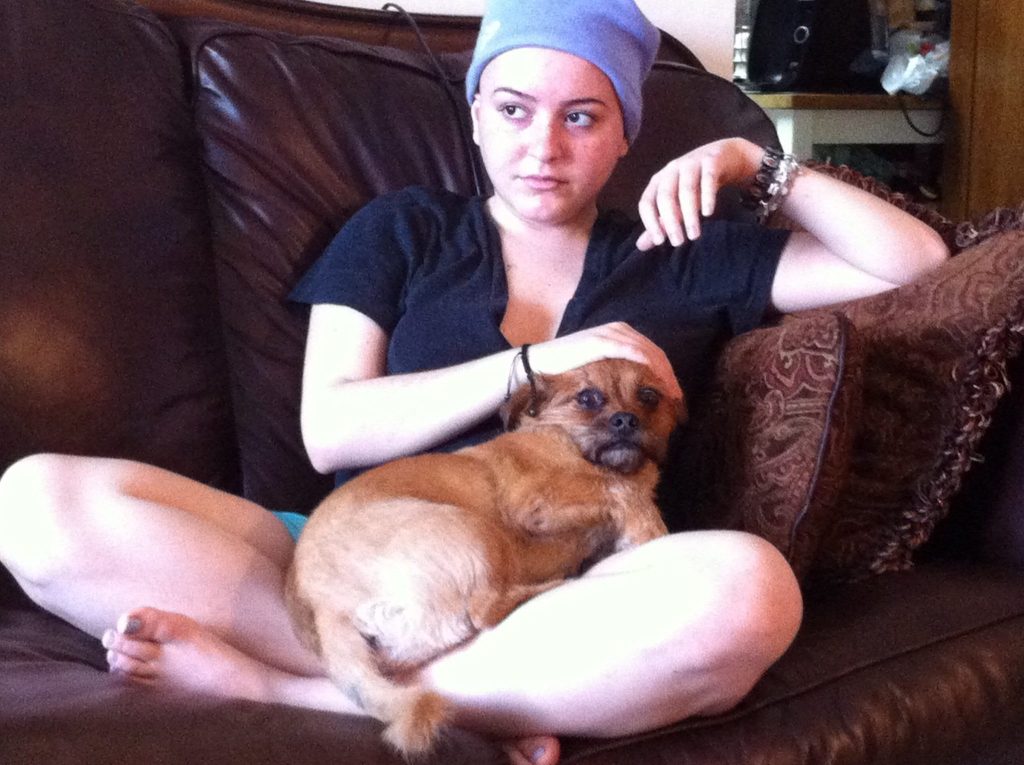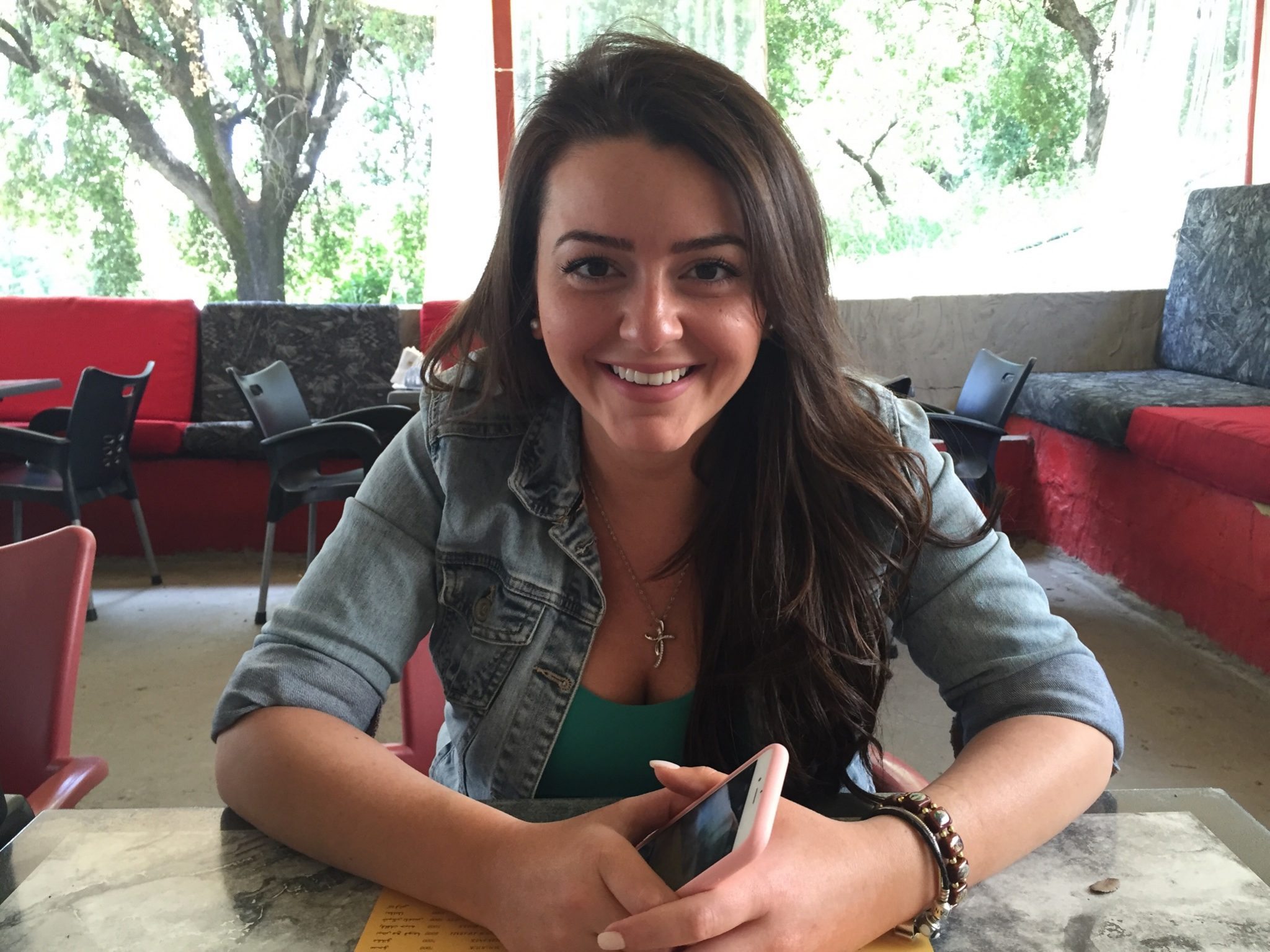
Marell Tomeh
Name: Marell Tomeh
Age: 22
City: Brampton, ON
What was/is your diagnosis? Acute Lymphoblastic Leukemia (ALL)
What year was it? What was your age at the time? April 2013. Age 19.
What is something you’ve done that you’re really proud of?
I was promoted supervisor at my workplace just after I turned seventeen.
But there’s also the cancer comeback effort; it’s the little things that I’m proud of. Surviving my first year back at school and doing well after spending two years away and developing really bad anxiety was a personal accomplishment. I also went public for the first time about my cancer by giving a speech as a cancer survivor at the Relay for Life event at the University of Toronto.
What is a top item on your life to do list?
Travel to a country in every continent.
What are your hobbies?
I love the outdoors and have a fetish for scenic landscapes. I love going on long car rides with music, playing volleyball, and am extremely family oriented. Hanging out with my family is definitely a hobby of mine.
Your diagnosis:
What was your life like before your diagnosis?
Super busy. I was in my first year at the University of Toronto Mississauga studying full time and working heavy hours as a supervisor at Shoppers Drug Mart while juggling a social life. It was my first and only job since age 15, and the store closes at midnight. Throughout high school and my first year of university, I would finish school then catch the bus to my shift to work four to midnight. Sometimes the only free time I had to see my friends was catching a tea or hot chocolate from Tim Hortons after my shift.
How did you find out you were sick? What led to your diagnosis?
I found a lump in my neck, which I learned was a swollen lymph node. I was oblivious to all other signs of weight and loss of energy. I was a full time student and practically a full time employee — every student will tell you they’re tired.
Since I was supposed to travel to Cuba with a group of friends right after exams, I thought to get a clear bill of health before travelling. After probably a month of tests, an oncologist performed a bone marrow biopsy on me. She suspected I either had Hodgkin’s or ALL. Turned out I had ALL and was transferred from my local hospital to Princess Margaret Cancer Center in Toronto.
The cancer was pretty advanced at that point. Her biopsy showed about 86 per cent leukemic cells in my blood, and in the two days of being transferred to PMH, I had another bone marrow biopsy done which showed about 96 per cent leukemic cells in my blood. A Hickman line was inserted immediately into my chest and within that same night. I was admitted into the hospital for one month to advance into the first phase of treatment.
What were your first thoughts when diagnosed?
“Don’t cry.” My mom was sitting in the corner of the room when the oncologist told me that I definitely had cancer, and it was just a matter of discovering what kind. That was my only thought at that moment, just pulling myself together. The oncologist tried prompting a reaction from me. She told me it was okay to cry but I just looked to her then back to the floor. I was sitting on the hospital bed at the time, so she walked towards me and sat next to me and started rubbing my back. At that point I fell apart.
I didn’t know much about my cancer until I was transferred to Princess Margaret Hospital. To me it was just a matter of “how long is my jail time” — either six months or two and a half years. Before hearing about prognosis, death never really crossed my mind, and I never really noticed that until a couple of months into treatment.
My first thoughts were honestly about losing my hair. I then thought about all the things I had to take care of before heading into treatment, such as my exams and work. I was trying to figure out a logical solution to deal with the repercussions. I just thought “two and a half years… Alright, get in and get out — That’s it.” I did not anticipate the repercussions of treatment. Recovery is just as difficult.
“I did not anticipate the repercussions of treatment. Recovery is just as difficult.”
In which hospitals were you treated?
Princess Margaret Cancer Center
What did your treatment consist of?
There were honestly so many different types of chemos and medications that I was put on. I was on the Dana Farber protocol. This first phase is the induction phase, which is intended to induce a remission. It consists of the one month of intense IV chemotherapy as an inpatient in the hospital alongside intrathecal chemo (lumbar punctures), intramuscular chemo, more oral chemo, and oral medication such as prednisone (steroids) and antibiotics.
Next is the CNS phase (Central Nervous System), which lasts for 20 days. This consists of 10 days of brain radiation, more frequent lumbar punctures, and more chemotherapy, oral chemo, and medication.
The next phase is intensification therapy, which is most definitely the worst phase. It consists of high doses of multiple kinds of weekly chemotherapy for a prolonged period — 10 three-week cycles (30 weeks total). More intravenous, intramuscular, intrathecal, and oral chemo. Alongside high dose steroids and antibiotics. For the entire two years of treatment, I was on steroids for five days until the start of the next cycle. The withdrawals would cause shooting paints in my knees. I was given oral morphine for this, but I did tried to avoid taking them.
Every hospital visit required me to stay for an hour after administration under their care. Throughout the very start of treatment, I was also on calcium and vitamin D for bone therapy. At the end of this phase is when I was diagnosed with Avascular necrosis.
Lastly is maintenance therapy, which is 24 three-week cycles (72 weeks), which has all that same fun stuff except doxorubicin is removed as a chemotherapy as well as asparagine and the steroid dosage is decreased slightly. The “bad” chemo (Doxorubicin) is stopped near the end of intensification so your hair starts to grow back slightly. Also, instead of visiting the hospital every week, you are permitted to visit a local clinic or have a nurse come to your home to inject you with methotrexate chemo for two of the three weeks.
Physically, I was extremely weak. I was forced to quit everything and was super bored at home. I would try to do some chores to keep busy, but had a short tolerance. For example, I would unload the dishwasher, feel a little nauseated, and sit down, then get up again to load it after an hour or so. There came a point where I couldn’t open water bottles and could barley climb the stairs. I would stumble over myself when I walked and fell to the floor when I stepped into houses or got off the hospital bed.
If I fell, I needed to push off of something to get up; otherwise someone had to help pick me up. Crossing the street gave me anxiety because I knew if I needed to run, I couldn’t. When I hit the maintenance therapy I was determined to get my strength back. I would go to the gym with my sister and try for the life of me to squat, but would need her by my side to help pull me up.
“Crossing the street gave me anxiety because I knew if I needed to run, I couldn’t.”
Emotionally, I could probably win an Oscar for bottling my emotions. I handle pain pretty well, so the physical pain and toll of cancer and chemo never worried me going into treatment, but I did not anticipate the mental toll. Doctors initially told me that depression was a side effect of treatment, but I honestly didn’t take them too seriously. I remember thinking, “of course I’m going to be sad; I’m 19 with cancer, but I’ll be fine, I can handle it.” I’ve had my fair share of adversities; this was just another bump in the road.
I definitely underestimated the mental and emotional stresses of treatment. I went from being in such a busy and active lifestyle to weekly hospital visits. I tried for a very long time to pretend like cancer couldn’t change anything and I would go out with friends like any regular outing, but it came to a point where I was placing a stress on myself for the sake of others. I never enjoyed myself going out and would put so much effort in pretending to be okay and be myself.
Being diagnosed at 19 and in treatment until I was 21, there was obviously a lot going on around me in terms of school and my social life. I had to come to terms with the fact that I was just not on the same page as everyone else. I realized that I needed to create my own world. I deactivated all social media and only really let those who knew me inside out into my little bubble. Because of this choice, I struggled with guilt of hiding away from those I know care for me, but I understand now it is just how I chose to survive.
Depression and anxiety hit me hard. The medication definitely played a role in the mood swings and depression factor. Steroid withdrawals toy with emotions, and I didn’t realize that until years into treatment. I also developed a crippling anxiety that I was not willing to admit to others or myself. I can honestly say I was ashamed of it. My anxiety was largely due to the physical changes my body was going through, as well as the mental changes I was trying to navigate.
Steroids blew up my face and made me put on a lot of weight. I didn’t look like myself and so I didn’t act like myself and I soon couldn’t recognize myself. I have always been a carefree, social person who could strike up conversation and who was always up for anything, but it came to the point where my anxieties were holding me in shackles. People knew me to be a strong person, one who was always smiling and who would always crack jokes and wasn’t afraid to be goofy or silly, but it came to a point where it just wasn’t natural anymore. It was almost like I forgot how to be funny, or even engage in conversation with new people. I hated my reflection and never wanted to go out into busy — or even public — places.
With my confidence being at an all time low, I felt like my personality was fading away. Because I couldn’t identify myself, I slowly started to lose value in myself. I was a hard worker, a good student, and had a lot of friends, but I just wasn’t me anymore. No matter how hard, I tried I just couldn’t be “Marell,” and that really affected me. I was constantly fighting myself, trying to push myself into situations to get over my fears and anxieties, and because I couldn’t break free, I always felt stuck and ashamed of this weakness. I felt I wasn’t being as “strong” as I knew I could be, or act the way people saw or expected me to be. It came to a point where I just needed absolute privacy to get through this time in my life.
What is your current medical status?
July 22, 2016 marks one official year post-chemo where I am in full remission.
Life after cancer:
How is life different for you now?
I initially thought that after treatment, I could just pick up where I left off, but I realized half way into treatment that this wasn’t the case. I am learning to adjust to the physical repercussions that treatment has left me with. On the less physical side, I am also getting used to this new me.
My energy levels are not what they used to be. Physically, I noticed a gradual return in physical strength on its own. I would take the stairs at school and would mark my progress each time until I could reach the top with better ease. My physical strength has not completely returned, but I know I need to work out to get back. My goal is to get strong enough to return to volleyball. I’ve played since I was 12 and didn’t realize how strong my legs were from playing. I do miss them, so my goal right now is to get those back.
Emotionally we all have our ups and downs, but I am much better with some of the issues I was struggling with then I was, let’s say a year ago.
I would say one of the bigger changes might be on the social level. Before treatment, I was very sociable and was always out in different groups. After developing social anxiety during treatment, I only really spent time with those closest to me. Now that I am better, my anxieties have definitely decreased and I don’t mind going out and meeting new people, but I don’t go out of my way to do so. I really only actively invest my time in those closest to me. It’s a weird phase and I can’t really say where I’m at. Sometimes I miss just going out to parties and having fun like the old days, but some days I don’t really care for it. I think I’m just missing some aspects of the “pre-cancer” Marell, and am still figuring myself out.
Spiritually, I’ve learned to trust God more. Pre-cancer, I believed in God’s existence and loved him, but I trusted myself more than anyone/being. After going through the ups and downs of treatment, trying my best to better my situation, and finding things just falling back on my face — sometimes within days — I hit an all time low. It wasn’t until time passed that I realized why every single effort failed me, and then good started to roll in. There were moments when I came to these understandings and just felt absolute peace and comfort that to this day I cannot explain, and just knew that I wasn’t alone in this. Now I just completely put my trust and faith into God and know that he knows what is best for me.
What is the toughest part about having cancer as a young adult?
Because I was diagnosed at 19 when I was just starting to get into the “university scene,” my friends were all turning of age and getting more active in the social scene. Watching them just act and be their age was hard. I was in treatment from 19-21; a lot of things happen during that time. I just felt like I was missing out on some really awesome memories at such a prime time in my life. More importantly, I felt like I was being held back by my cancer.
I have always worked and been in school simultaneously since I was young; I was always in a rush to get an education so I can just make money and actually have time to live my life. Being held back two years really bugged me. I would constantly try to calculate and map out how many courses I should take once I returned to school so I wouldn’t be too far behind. I returned after two years of treatment and entered into second year while other kids my age were graduating. It was tough accepting that, but now I think I am more at peace with these things.
What really kept you going while you were sick?
Support. I would not be here without those who loved me, and I don’t think I survived for myself; it’s really for your supporters. Medications, your situation, they can definitely do crazy things to your emotional state, but it was those who stuck by me even when I was not easy to be around that kept me going. Whether taking me out on car rides just to clear my head and get out of the house, or hosting movie nights at home to spend time together doing something I was most comfortable doing. They all adjusted their lives to accommodate this different version of me, and I 100 per cent felt their love support and consideration. They really went through treatment alongside me.
Also, it really helped me to fantasize about the future, but that can be dangerous. Sometimes all we have are dreams.
What kept you busy during treatment?
I always juggled with the thought of going back to school once my treatment was a bit more manageable, but my anxiety really made that difficult. I was desperate to return to any sense of normalcy and thought pushing myself into school would help me get over some of these fears. I even enrolled a few times, bought new clothes, then de-registered after weeks and weeks of just driving myself nuts over the thought of returning. I am definitely glad I didn’t, though. Looking back now, I don’t think I would have been able to physically or mentally handle school and school-life during that point in my life.
After a year into treatment, I was encouraged by my sister and her friend to volunteer, which they did with me. I volunteered for Peel Children’s Centre and tutored a young girl with health challenges of her own. I later enrolled in French courses that were being offered near my house to keep my brain jogging, and was looking into online courses that my school offered. I took the one and only course that was offered online, which happened to be Introduction to Christianity.
How are you connected with Young Adult Cancer Canada?
I denied all professional help from my hospital. Most of the time I thought, “I know what the problem is, I know what the solution is, and it’s not attainable right now. There is nothing anyone can say or do to fix this.” It is difficult for me to express my thoughts and feelings to those who don’t know me very well; even then, I tend to keep things to myself. I just only really needed those that I loved to be there for me, which of course they were, and I believe I have a tough enough support system to help me get through.
But there was a point during my treatment where I just kept hitting road bumps. I was dealing with additional diagnoses, a potential relapse, and chronic pain. When I was diagnosed with Avascular necrosis in both my knees and hips, it was really tough for me to swallow. I was okay with temporary pain of treatment, but I never considered long-term effects — especially physical ones that are irreversible. I dealt with a lot of guilt after this, that maybe if I had know this was a potential problem, mayber there were some things I could have done to prevent such an outcome.
Since I was diagnosed at 19, I was admitted to Princess Margaret Hospital where I was surrounded by patients far older than me. There was no one my age who I could relate to. After running into so many problems, I asked my hospital to connect me with someone my age and gender with my same diagnosis. I wanted to know what else to expect, how to prepare or prevent what else might come, and how she was coping with some of the challenges I was facing.
My nurse connected with YACC where Karine connected me to Christina Caverly who definitely helped me through the rest of my treatment. Christina encouraged me to go to the retreats and conferences, which I denied since I was still struggling with high anxiety. I finally agreed in 2015. I decided to go because I was nearing the end of treatment and I wanted to learn what to expect post treatment and how to adjust into post-treatment life. It was kind of like a research project where I could meet with people who have or are adjusting back to “real life” currently. Best decision ever.
The issues:
Did you feel isolated from your peers since your diagnosis?
When asked this before, whether I have lost friends or not after cancer, I always said that I made the choice of isolating myself. I wasn’t public about my diagnosis and kind of dealt with the fears and challenges privately. I am known to be a private person, so I know a lot of people were giving me space, letting me know through loved ones they were thinking of me, and checked up on me every now and then, which I really appreciated.
Like I mentioned before, when friends in my social circle planned to get together, I tried really hard in the beginning to pretend like nothing changed and go out with them like I normally would. When things got worse, I decided to decline invitations and keep to myself. After developing social anxiety, I rarely went out to public places. Going from being really social to scared of going out into public, there were times were I was bored and alone and wish I could just call up my friends and go out like the old days.
Although we talk from time to time, I have grown apart from many of the friends I used to have. We are just on different pages in our lives, but I’ve let go of a lot of the guilt I’ve harboured from isolating myself. After experiencing such persistent and unconditional love and support, I realize that those who really cared would have made the effort to figure out why I was isolating myself and try to understand my situation. And honestly, as someone going through cancer and obvious physical changes, some of the things I was invited to weren’t very considerate of my situation. It was those who were literally just there who really made a difference.
Sometimes I do feel like I’m on a different page than most people my age, which has been a bit challenging to navigate through. I’m just trying to figure out where I fit in now.
Did anyone talk to you about fertility options before treatment? If so, how did that affect your decisions? If not, what do you wish you had known?
No. My cancer was so progressed that there was no time to even discuss the issue. I was admitted for treatment immediately. It wasn’t until a friend of mine with the same diagnosis discussed the topic and told me she was given the opportunity to freeze her eggs that I was a little upset. I was not even aware that fertility was something I should worry about. I wish I would have been able to discuss the topic at the time, but I am planning to run some fertility tests soon.
Has your cancer diagnosis affected any of the relationships in your life? If so, how, and how are you managing them?
I think cancer affects every relationship, whether it’s with your friends, family, or romantic relationships. In terms of friends and family, I would say I learned a lot about each specific relationship I have with those I love. I faced some disappointments initially, but soon learned the dynamic of each relationship I had with my supporters. I am lucky enough to have such an amazing team, and what qualities or needs I cannot find in one friendship, I can find in one of my sisters, for example, and vice versa. Each person in my life can help and comfort different aspects of myself in different ways. Their unconditional love is most comforting
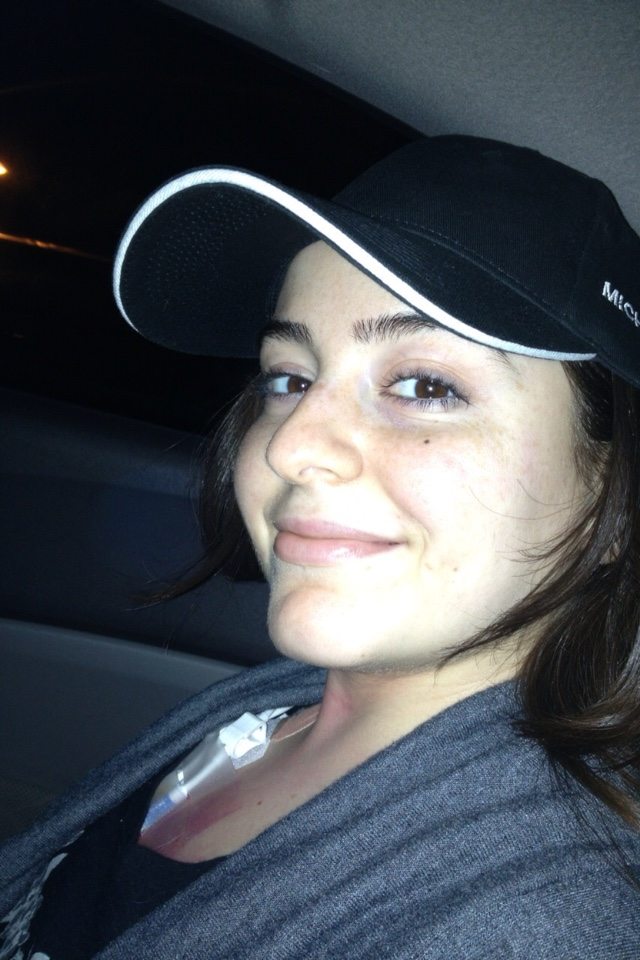 How has your cancer experience affected your body image, and your relationship to your body?
How has your cancer experience affected your body image, and your relationship to your body?
I’ve struggled with body image my entire life, but cancer definitely fed all those demons and introduced new ones. Just when I was starting to become a little more comfortable with my body, I was diagnosed and experienced drastic changes to my appearance.
Losing my hair, of course, was a big insecurity. I could probably pick on every inch of my body, but the one thing that I had zero complaints on was my hair. I bought a wig that closest resembled my own hair, but the hairline was so unnatural that I always wore hats and felt really insecure about dressing to accommodate my baseball caps and hats. Who wears a baseball hat at night or when it’s raining? Someone with cancer (don’t be so quick to judge).
Soon into treatment, my hair became the least of my worries. Steroids graced me with the notorious moon face that I could not hide. I gained a lot of weight from the steroids. It gave me a high appetite while dissolving all muscle mass from the waist down.
I was an emotional eater and was too weak to be physically active and depression didn’t help with this. I was disgusted with myself, and as soon as I reached maintenance therapy, I was determined to work out. I initially couldn’t go without supervision as a could barley pick myself up from off the floor and would get really nauseated.
I tried to keep super healthy with my eating habits, but as soon as I would go into steroid withdrawals, the cravings were extremely difficult to combat. I tried everything from juicing to morning trails with a friend, but I barely saw any changes. My emotional energy was at a low. The steroids also disproportioned my body weight in conjunction with loss of muscle; I just hated how I looked. Like I said, I’ve always had my issues with my insecurities, but if I dressed up and tried to look nice, I could.
With the cancer, no matter what I did, I hated my reflection; I didn’t look like myself, and because of that, I slowly started to lose sight of my self. I would look at old pictures and just completely shut down because I couldn’t believe that the girl in the picture was me.
With losing my confidence, I lost my personality, and really just grieved over the loss of myself, which led to a loss of self worth. I felt like I lost my sense of humour; even when I tried, I hated that I was trying to be funny and make jokes until I completely forgot how to. I felt like I wasn’t fun to be around anymore, I was no longer sociable, I didn’t know how to talk to people or engage in conversation. I would either choke up or avoid it completely.
Now I can say that I am much better, but I am still searching for some parts of myself that I think I lost, and just figuring out who I am now. I believe body image has a direct relation to this. I am unhappy with some of the changes my body has gone through, but slowly coming to terms with it. I definitely appreciate my self pre-cancer now, and think I was stupid to be as insecure as I was. I don’t think I will ever have a perfect relationship with my body — I don’t think anyone can — but I’m trying, and considering where I was and where I am now, I would say that I’m much better.
What are some lifestyle changes you’ve made since your diagnosis?
My goal is to be strong; I never want to feel as weak as I did when I was sick. I work out now mainly to be stronger, gaining confidence is secondary.
Although I was conscious before treatment, I am more conscious of what I put into my body now. My general rule of thumb is to do what makes you feel good. That goes for everything: what you eat, who you spend time with. I think I kind of skipped the “freshman at college” phase and am more interested and kicking it back with those I love and know me best. I’m forever seeking out good vibes and will adjust my life accordingly.
Resources and recommendations:
What would you add to a treatment-day playlist?
Ouuu. It varies; I listened to some pretty sad songs, so maybe I’m the wrong person to ask for this, but I always listened to some personal favourites.
Have you participated in any other retreats, conferences, programs, or support groups you’d like your cancer peers to know about?
Survivor conference 2015 and 2016! Great way to spend an entire weekend with the YACC family. They host wicked workshops and activities around the city that it’s hosted in. I have been waiting to attend Retreat Yourself Adventure, which I am hoping to do this year.
Are there any other resources you’d like to recommend?
Volunteering anywhere to pass the time. The AYA Canada website is actually really useful when it comes to finding resources for school, scholarships, and other organizations that can give you a break with living with cancer.
Stay in touch:
What would you like to say to other young adults dealing with cancer who are reading this profile?
It gets better. But it gets worse before it can get better. Find your comfort zone and stick to it; sometimes that takes time but when you find it, ride it for the rest of treatment. Whatever helps you get through — do it. Don’t feel guilty for how you choose to survive.
Are you interested in helping others facing cancer challenges? If so please let us know how you can be contacted.
Absolutely. Message me on Facebook, and if for some chance you can’t find me email me. [EDITOR’S NOTE: Send your message to [email protected] and we’ll forward it on to Marell.]

